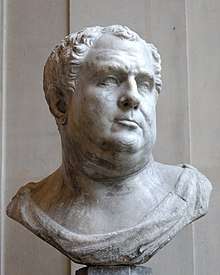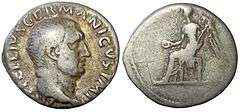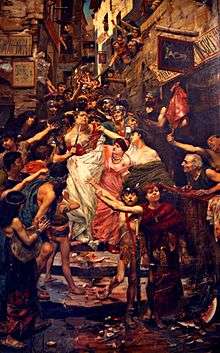Vitellius
| Vitellius | |||||||||
|---|---|---|---|---|---|---|---|---|---|
 Pseudo-bust of Emperor Vitellius, Louvre | |||||||||
| Emperor of the Roman Empire | |||||||||
| Reign |
16 April AD 69 – 22 December AD 69 (8 months) | ||||||||
| Predecessor | Otho | ||||||||
| Successor | Vespasian | ||||||||
| Born |
24 September 15 Rome | ||||||||
| Died |
22 December 69 (aged 54) Rome | ||||||||
| Spouse |
Petronia Galeria Fundania | ||||||||
| Issue |
Aulus Vitellius Petronianus Aulus Vitellius Germanicus Vitellia | ||||||||
| |||||||||
| Dynasty | Year of the Four Emperors | ||||||||
| Father | Lucius Vitellius | ||||||||
| Mother | Sextilia | ||||||||
| Roman imperial dynasties | |||
|---|---|---|---|
| Year of the Four Emperors | |||
| Chronology | |||
| Succession | |||
|
|||

Vitellius (/vɪˈtɛliəs/; Latin: Aulus Vitellius Germanicus Augustus;[1] 24 September 15 – 22 December 69 AD) was Roman Emperor for eight months, from 16 April to 22 December AD 69. Vitellius was proclaimed emperor following the quick succession of the previous emperors Galba and Otho, in a year of civil war known as the Year of the Four Emperors.
Vitellius was the first to add the honorific cognomen Germanicus to his name instead of Caesar upon his accession; the latter name had fallen into disrepute in many quarters because of the actions of Nero.
His claim to the throne was soon challenged by legions stationed in the eastern provinces, who proclaimed their commander Vespasian emperor instead. War ensued, leading to a crushing defeat for Vitellius at the Second Battle of Bedriacum in northern Italy. Once he realised his support was wavering, Vitellius prepared to abdicate in favor of Vespasian but was executed in Rome by Vespasian's soldiers on 22 December 69.
Family
He was the son of Lucius Vitellius Veteris and his wife Sextilia, and had one brother, Lucius Vitellius the Younger. Suetonius recorded two different accounts of the origins of the gens Vitellia, one making them descendants of past rulers of Latium, the other describing their origins as lowly. Suetonius makes the sensible remark that both accounts might have been made by either flatterers or enemies of Vitellius—except that both were in circulation before Vitellius became emperor.[2] Since his father was a member of the equestrian class and achieved the senatorial rank only later in his lifetime, Vitellius became the first emperor not to be born in the senatorial family. Suetonius also recorded that when Vitellius was born his horoscope so horrified his parents that his father tried to prevent Aulus from becoming a consul.[3]
In his youth he was one of the noble companions of Tiberius' retirement on Capri and there befriended Caligula, whose favour he won, according to Suetonius, by sharing in his passion for chariot racing and games of dice.[4]
He married firstly before the year 40 a woman named Petronia, daughter of Publius Petronius or Gaius Petronius Pontius Nigrinus, by whom he had a son, Aulus Vitellius Petronianus, the universal heir of his mother and grandfather, whom Vitellius had killed in 69 in order to inherit his fortune.
He married secondly, around the year 50, a woman named Galeria Fundana, perhaps the granddaughter of Gaius Galerius, Prefect of Egypt in 23. They had two children, a son called Aulus Vitellius Germanicus or Novis, the Younger, and a daughter, Vitellia, who married the Legatus Decimus Valerius Asiaticus.
Public service
Political and military career
He was Consul in 48, and proconsular governor of Africa in either 60 or 61, in which capacity he is said to have acquitted himself with credit. At the end of 68, Galba, to the general astonishment, selected him to command the army of Germania Inferior, and here Vitellius made himself popular with his subalterns and with the soldiers by outrageous prodigality and excessive good nature, which soon proved fatal to order and discipline.[5]
Bid for power
He owed his elevation to the throne to Caecina and Fabius Valens, commanders of two legions on the Rhine. Through these two men a military revolution was speedily accomplished; they refused to renew their vows of allegiance to Emperor Galba on 1 January 69, and early in 69 Vitellius was proclaimed emperor at Cologne. More accurately, he was proclaimed Emperor of the armies of Germania Inferior and Superior.[5] The armies of Gaul, Brittania and Raetia sided with them shortly afterwards. By the time that they marched on Rome, however, it was Otho, and not Galba, whom they had to confront.
In fact, he was never acknowledged as Emperor by the entire Roman world, though at Rome the Senate accepted him and decreed to him the usual Imperial honours. He advanced into Italy at the head of a licentious and rough soldiery, and Rome became the scene of riot and massacre, gladiatorial shows and extravagant feasting.[5] To reward his victorious legionaries, Vitellius disbanded the existing Praetorian Guard and installed his own men instead.
Emperor
Administration
Suetonius, whose father had fought for Otho at Bedriacum, gives an unfavourable account of Vitellius' brief administration: he describes him as unambitious and notes that Vitellius showed indications of a desire to govern wisely, but that Valens and Caecina encouraged him in a course of vicious excesses which threw his better qualities into the background.[5] Vitellius is described as lazy and self-indulgent, fond of eating and drinking, and an obese glutton, eating banquets four times a day and feasting on rare foods he would send the Roman navy to procure.
For these banquets, he had himself invited over to a different noble's house for each one. He is even reported to have starved his own mother to death—to fulfill a prophecy that he would rule longer if his mother died first; alternatively there is a report that his mother asked for poison to commit suicide—a request he granted.[6] Other writers, namely Tacitus and Cassius Dio, disagree with some of Suetonius' assertions, even though their own accounts of Vitellius are scarcely positive ones.
Despite his short reign he made two important contributions to Roman government which outlasted him. Tacitus describes them both in his Histories:
- Vitellius ended the practice of centurions selling furloughs and exemptions of duty to their men, a change Tacitus describes as being adopted by 'all good emperors'.
- He also expanded the offices of the Imperial administration beyond the imperial pool of freedmen, allowing those of the Equites to take up positions in the Imperial civil service.
Vitellius also banned astrologers from Rome and Italy on 1 October, 69. Some astrologers responded to his decree by anonymously publishing a decree of their own: "Decreed by all astrologers in blessing on our State Vitellius will be no more on the appointed date." In response, Vitellius executed any astrologers he came across.[7]
Challenges
In July 69, Vitellius learned that the armies of the eastern provinces had proclaimed a rival emperor: their commander, Titus Flavius Vespasianus. As soon as it was known that the armies of the East, Dalmatia, and Illyricum had declared for Vespasianus, Vitellius, deserted by many of his adherents, prepared to resign the title of emperor.[5]
Resignation and death

Tacitus' Histories state that Vitellius awaited Vespasian's army at Mevania. The terms of resignation had actually been agreed upon with Marcus Antonius Primus, the commander of the sixth legion serving in Pannonia and one of Vespasian's chief supporters. However, as he was on his way to deposit the insignia of empire in the Temple of Concord, the Praetorian Guard refused to allow him to carry out the agreement, and forced him to return to the palace.[5]
On the entrance of Vespasian's troops into Rome, Vitellius' supporters (mostly civilians) organized heavy resistance, resulting in a brutal battle. Entrenched on the city's buildings, they threw stones, javelins, and tiles on Vespasian's soldiers who consequently suffered heavy casualties in the urban fighting. Cassius Dio claims that 50,000 people died in the battle for Rome.[8] Vitellius was eventually dragged out of a hiding-place (according to Tacitus a door-keeper's lodge), driven to the fatal Gemonian stairs, and there struck down by Vespasian's supporters. "Yet I was once your emperor," were his last words. His body was thrown into the Tiber according to Suetonius; Cassius Dio's account is that Vitellius was beheaded and his head paraded around Rome, and his wife attended to his burial. His brother and son were also killed.
Suetonius, in writing of Vitellius' execution, offers his physical description: "...He was in fact abnormally tall, with a face usually flushed from hard drinking, a huge belly, and one thigh crippled from being struck once by a four-horse chariot, when he was in attendance on Gaius as he was driving..."[9]
Years before there was a prediction that he would fall into the power of a man from Gaul; the man who slew him was Antonius Primus of Tolosa and whose surname was Becco which means "Rooster's beak" (Gallus means both "a cock" and "a Gaul").[10]
Portrayals in art
Vitellius is also shown in the painting Decadence of the Romans by Thomas Couture.
.jpg)
Fictional portrayals
- Vitellius is a character in Kate Quinn's novel Daughters of Rome (2011), set in AD 68–79.[11]
- He is also a prominent character in Simon Scarrow's Eagle series, where he is introduced as a rival to Vespasian and an adversary to the main characters, Macro and Cato, during the invasion of Britain.
- Vitellius is a character in M.C. Scott's novel Rome, The Art of War (2013). Although emperor in the novel, his brother Lucius is portrayed as being the more powerful and skilled in intrigue and ruthlessness.
- He is also introduced in chapter XX of Henry Venmore-Rowland's novel The Last Caesar (2012),[12] as the newly appointed Governor of Lower Germania at the beginning of AD 69.
- Lindsey Davis' historically accurate crime novel set in Ancient Rome, The Silver Pigs, notes a recipe for mushy peas was named after him. (Chapter XX, p. 3)[13]
- Steven Saylor, in his novel "Empire: The Novel of Imperial Rome" devotes a chapter to Vitellius.
References
- ↑ Classical Latin spelling and reconstructed Classical Latin pronunciation:
- AVLVS VITELLIVS GERMANICVS AVGVSTVS
- IPA: [ˈau̯.lʊs wɪˈtɛl.li.ʊs gɛr'maː.nɪ.kʊs au̯ˈgʊs.tʊs]
- ↑ Suetonius. The Lives of the Twelve Caesars: The Life of Vitellius. Chapter 1
- ↑ Suetonius. The Lives of the Twelve Caesars: The Life of Vitellius. Chapter 3, part 2
- ↑ Suetonius, Vitellius, 3.2; 4.1
- 1 2 3 4 5 6

- ↑ Suetonius "Vitellius" Chapter 14
- ↑ Tamsyn Barton, Ancient Astrology, p. 47-48.
- ↑ Kelly (2007), p. 169, 171.
- ↑ Suetonius "Vitellius" Chapter 17
- ↑ Suetonius "Vitellius" Chapter 18
- ↑ Quinn, Kate (2011). Daughters of Rome. Headline Review.
- ↑ Venmore-Rowland, Henry (2012). The Last Caesar. Bantam Press (an imprint of Transworld Publishers).
- ↑ "Vitellian Peas". Big Oven.
External links
| Wikimedia Commons has media related to Vitellius. |
Primary sources
- Life of Vitellius (Suetonius; English translation and Latin original)
- Cassius Dio, Book 64
- Continuité gentilice et continuité sénatoriale dans les familles sénatoriales romaines à l'époque impériale, 2000
Secondary sources
- Kelly, Benjamin (2007). "Riot Control and Imperial Ideology in the Roman Empire". Phoenix. Toronto: University of Toronto Press, Classical Association of Canada. 61 (1/2): 150–176.
- Biography at livius.org
- Biography at De Imperatoribus Romanis
- Aulus Vitellius entry in historical sourcebook by Mahlon H. Smith
| Political offices | ||
|---|---|---|
| Preceded by Gnaeus Hosidius Geta, and Gaius Volasenna Severus as Suffect consuls |
Consul of the Roman Empire 48 with Lucius Vipstanus Publicola Messalla |
Succeeded by Quintus Veranius Nepos, and Gaius Pompeius Longus Gallus as Suffect consuls |
| Preceded by Otho |
Roman Emperor 69 |
Succeeded by Vespasian |